PBKDF from PKCS #12, appendix B. More...
 Inheritance diagram for PKCS12_PBKDF< T >:
Inheritance diagram for PKCS12_PBKDF< T >:Public Member Functions | |
| std::string | AlgorithmName () const |
| Provides the name of this algorithm. More... | |
| size_t | MaxDerivedKeyLength () const |
| Determine maximum number of bytes. More... | |
| size_t | GetValidDerivedLength (size_t keylength) const |
| Returns a valid key length for the derivation function. More... | |
| size_t | DeriveKey (byte *derived, size_t derivedLen, const byte *secret, size_t secretLen, const NameValuePairs ¶ms=g_nullNameValuePairs) const |
| Derive a key from a seed. More... | |
| size_t | DeriveKey (byte *derived, size_t derivedLen, byte purpose, const byte *secret, size_t secretLen, const byte *salt, size_t saltLen, unsigned int iterations, double timeInSeconds) const |
| Derive a key from a secret seed. More... | |
 Public Member Functions inherited from KeyDerivationFunction Public Member Functions inherited from KeyDerivationFunction | |
| virtual size_t | MinDerivedKeyLength () const |
| Determine minimum number of bytes. More... | |
| virtual bool | IsValidDerivedLength (size_t keylength) const |
| Returns whether keylength is a valid key length. More... | |
| virtual void | SetParameters (const NameValuePairs ¶ms) |
| Set or change parameters. More... | |
 Public Member Functions inherited from Algorithm Public Member Functions inherited from Algorithm | |
| Algorithm (bool checkSelfTestStatus=true) | |
| Interface for all crypto algorithms. More... | |
| virtual std::string | AlgorithmProvider () const |
| Retrieve the provider of this algorithm. More... | |
 Public Member Functions inherited from Clonable Public Member Functions inherited from Clonable | |
| virtual Clonable * | Clone () const |
| Copies this object. More... | |
Static Public Member Functions | |
| static std::string | StaticAlgorithmName () |
Detailed Description
template<class T>
class PKCS12_PBKDF< T >
PBKDF from PKCS #12, appendix B.
- Template Parameters
-
T a HashTransformation class
- See also
- PasswordBasedKeyDerivationFunction, PKCS12_PBKDF on the Crypto++ wiki
- Since
- Crypto++ 2.0
Definition at line 320 of file pwdbased.h.
Member Function Documentation
◆ AlgorithmName()
|
inlinevirtual |
Provides the name of this algorithm.
- Returns
- the standard algorithm name
Implements KeyDerivationFunction.
Definition at line 332 of file pwdbased.h.
◆ MaxDerivedKeyLength()
|
inlinevirtual |
Determine maximum number of bytes.
- Returns
- Maximum number of bytes which can be derived
Reimplemented from KeyDerivationFunction.
Definition at line 337 of file pwdbased.h.
◆ GetValidDerivedLength()
|
virtual |
Returns a valid key length for the derivation function.
- Parameters
-
keylength the size of the derived key, in bytes
- Returns
- the valid key length, in bytes
Implements KeyDerivationFunction.
Definition at line 377 of file pwdbased.h.
◆ DeriveKey() [1/2]
|
virtual |
Derive a key from a seed.
- Parameters
-
derived the derived output buffer derivedLen the size of the derived buffer, in bytes secret the seed input buffer secretLen the size of the secret buffer, in bytes params additional initialization parameters to configure this object
- Returns
- the number of iterations performed
- Exceptions
-
InvalidDerivedKeyLength if derivedLenis invalid for the scheme
DeriveKey() provides a standard interface to derive a key from a secret seed and other parameters. Each class that derives from KeyDerivationFunction provides an overload that accepts most parameters used by the derivation function.
the number of iterations performed by DeriveKey() may be 1. For example, a scheme like HKDF does not use the iteration count so it returns 1.
Implements KeyDerivationFunction.
Definition at line 385 of file pwdbased.h.
◆ DeriveKey() [2/2]
| size_t PKCS12_PBKDF< T >::DeriveKey | ( | byte * | derived, |
| size_t | derivedLen, | ||
| byte | purpose, | ||
| const byte * | secret, | ||
| size_t | secretLen, | ||
| const byte * | salt, | ||
| size_t | saltLen, | ||
| unsigned int | iterations, | ||
| double | timeInSeconds | ||
| ) | const |
Derive a key from a secret seed.
- Parameters
-
derived the derived output buffer derivedLen the size of the derived buffer, in bytes purpose a purpose byte secret the seed input buffer secretLen the size of the secret buffer, in bytes salt the salt input buffer saltLen the size of the salt buffer, in bytes iterations the number of iterations timeInSeconds the in seconds
- Returns
- the number of iterations performed
- Exceptions
-
InvalidDerivedKeyLength if derivedLenis invalid for the scheme
DeriveKey() provides a standard interface to derive a key from a seed and other parameters. Each class that derives from KeyDerivationFunction provides an overload that accepts most parameters used by the derivation function.
If timeInSeconds is > 0.0 then DeriveKey will run for the specified amount of time. If timeInSeconds is 0.0 then DeriveKey will run for the specified number of iterations.
Definition at line 406 of file pwdbased.h.
The documentation for this class was generated from the following file:
